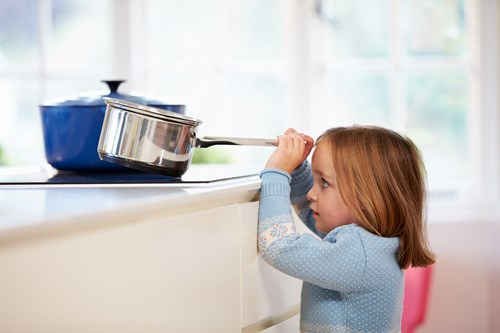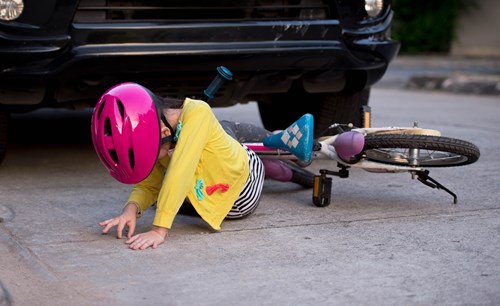Child Safety: Safe From Accidents
Did you know that the home & garden are the most common places for an accident to happen, and a huge 80% of accidents affect the under 5’s?
Children develop so quickly, that sometimes we often hear parents say “I didn’t know he could do that…”
With Child Safety Week this week (7th – 13th June 2021), we wanted to highlight some of the key messaging that the Child Accident Prevention Trust are talking about, to help you know all the facts and safety tips surrounding child safety.
|
Safe from Burns From hot drinks, bath water, fire and heaters to button batteries and magnetic toys. A small child’s skin is much thinner than an adults, and therefore burns really easily.
|
 |
Prevent Poisoning
Small children are curious and learn by putting things in their mouth, so its difficult when there are bright bottles of cleaning liquid, washing tables and medicines that look like sweets or toys all around the home. They also learn by observing and copying those around them, so watching their parents take some painkillers and then come across them at nannies house, only brings out their inquisitiveness.
- Keep all washing & cleaning products high up or in a lockable cupboard, making sure to put everything away as soon as you’ve used them
- Whist shopping, look our for products with bittering agents like Bitrex, which make it taste so horrible, children spit out instead of swallowing
- Keep all medicines out of reach and sight, ideally high up or in a lockable cupboard
- Watch out for those painkillers you may carry in your handbag or leave in your bedside drawer
Breathe Easy
When you think of your child stopping breathing, there is nothing worse, but there are some simple steps to prevent that from happening. Be aware of suffocation whist they are sleeping, window blind cords, nappy sacks, plastic bags and choking hazards, such as round food items.
- A clear cot is a safe cot – removing duvets, pillows and any soft toys whilst they sleep
- Follow the T.I.C.K.S advice for slings or carriers babyslingsafety.co.uk
- Fit cleat hooks or tensioners to blind cords and chains or consider cord free blinds
- Store nappy sacks well out of reach of babies
- Cut round fruit in halves or quarters, length ways
- Cut food such as carrots, apples and sausages into thin strips
- Avoid popcorn, marshmallows and hard round sweets like mini eggs
- Move any small parts from toys out of reach
Free from Falls
Babies soon learn to wriggle and kick and therefore its not long before they can roll over, meaning they could roll off beds and changing tables. Once they are crawling, they then want to pull themselves up or climb, meaning the risk of falling increases. Of course, scrapes and bruises are a part of growing up, but prevention from a nasty fall which could lead to a bad head injury is top priority in child safety.
- Small babies can wriggle off a bed or changing table, so change their nappy on the floor
- Once they can stand, remove any large toys from their cot they might climb on to try and get out
- As soon as they start moving around, fit safety gates around the home, especially top and bottom of the stairs
- Use the straps on the highchair every time, to avoid children trying to reach for things and toppling out
- Remove any furniture from close to windows, as children are curious and want to see out of the window
- If possible, fit safety catches or locks to all your windows – making sure to keep the keys safe so you can find them in case of a fire
- Trampolines are increasingly popular and the biggest risk is having two people with different weights, so allow children to take it in turns bouncing and use a safety net or cage to avoid children being thrown onto the ground
|
Safe around Roads Road safety can be difficult to teach your children, but there are some key steps that can be put in place. Children will also copy what you do, so if you can do the right thing, it will help them get into good habits.
|
 |
Watch out in Water
A stark fact is that drowning often happens silently, not like in the movies where they splash around and cry for help. Babies can drown in as little as 5cm of water and one of the most common causes of child death.
- Get everything you need ready for bath time and never leave your baby or young child alone, even for a moment and empty it as soon as you’ve finished
- Bath seats are great for support but they are not a safety aid
- Empty the paddling pool when not in use and overturn any items around the garden that could collect water
- Fence off garden ponds and be alert to these in neighbours or friends gardens when visiting
- Explain the dangers of swimming in open water as your children get older, especially relating to currents that cannot be seen from above the surface
- Teach children to choose safe places to swim, such as between the two-coloured flags at the beach
Fire Safe families
Did you know that you and your family are eight times more likely to die in a fire if you don’t have a working smoke alarm? If a fire breaks out at night, the poisonous fumes will send you into a deeper sleep and you wont smell the smoke and wake up. Make sure you have smoke alarms fitted upstairs and downstairs, and check them monthly to make sure they work.
- Cooking fires are the main cause of fires in the home, so stay in the kitchen and do not leave anything unattended
- Keep matches, lighters, lit candles and tea-lights all out of reach and teach children not to play with them
- Prevent plugging lots of chargers and equipment into extension leads from one electrical socket, as this can dangerously overload the socket
- Store electrical items away safely, such as hair straighteners
- Double check that your cigarette is fully out and be extra careful smoking if you are tired, in case you fall asleep with it in your hand
- Plan your escape route, in case of fire and practise it with your family, keeping stairs and escape routes free from clutter
- Teach children what to do if they see a fire
- Do not try and put the fire out yourself, get out as quickly as possible and call 999, never going back inside for anything
For all the fact sheets from the Child Accident Prevention Trust in full, please visit https://www.capt.org.uk/csw-factsheets and if you are interested in gaining basic first aid skills, take a look at our First Aid for Parents Course, teaching you about baby & child CPR, choking sequences and what to do in an emergency situation at home.